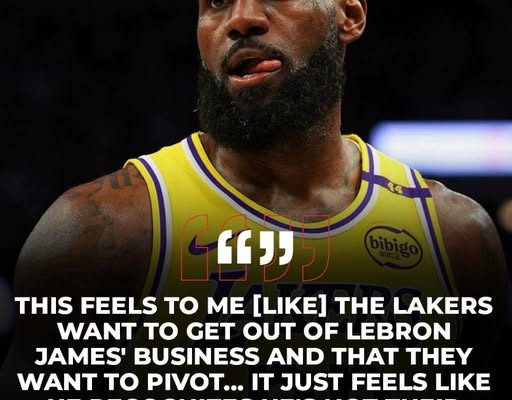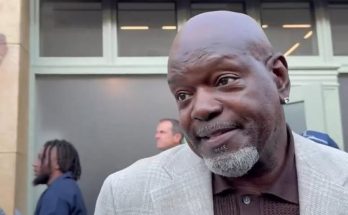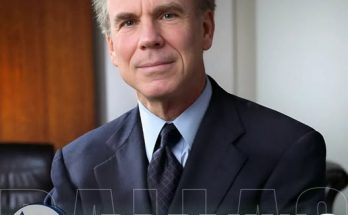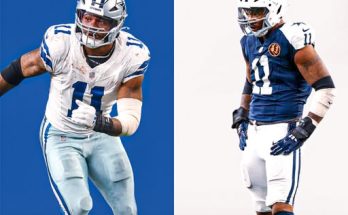The Los Angeles Lakers, one of the NBA’s most storied and glamorous franchises, are reportedly preparing to shift their focus away from LeBron James, signaling what could be the most significant turning point in the team’s modern era. Since joining the Lakers in 2018, LeBron has been the centerpiece of the organization, the undeniable face of the franchise, and the driving force behind its return to championship glory in 2020. However, time in professional sports is relentless, and as LeBron approaches the twilight of his career, the Lakers appear ready to pivot toward a new chapter that places the future above the present. This decision, while unsurprising to some, represents a monumental philosophical shift for a team that has historically built itself around superstar names. The conversation is no longer about simply surrounding LeBron with enough talent to make another deep playoff push—it’s about preparing for life after him.
For years, the Lakers’ identity has been intertwined with LeBron’s ability to elevate them into contention regardless of the roster’s limitations. His arrival instantly restored the franchise’s allure, pulling them out of the darkest stretch in their history—a half-decade without a playoff appearance. The front office built around him, sacrificing young prospects and draft capital to maximize the short-term championship window. This win-now approach paid dividends with the 2020 NBA title inside the Orlando bubble, but the costs have been substantial. Draft assets have been depleted, the roster has lacked continuity, and depth has often been sacrificed in favor of top-heavy star power. Now, with LeBron entering the final stages of his career, the Lakers are reportedly reassessing that model. Their focus is shifting toward building around younger talent and positioning themselves to compete well into the next decade.
The pivot does not necessarily mean LeBron will be shown the door or that the organization has lost faith in his abilities. In fact, he remains one of the most productive players in the league, a testament to his longevity and meticulous care for his body. However, the Lakers know that Father Time remains undefeated, and relying solely on LeBron’s dominance is no longer a sustainable strategy. His minutes are being managed more cautiously, and the team has been exploring roster moves that emphasize versatility, youth, and long-term potential rather than immediate, win-at-all-costs trades. This type of transition can be delicate, especially with a player of LeBron’s stature. The Lakers will need to navigate the balance between honoring his legacy and making the tough decisions necessary for the team’s future.
Central to this new direction is Luka Dončić, whose arrival in Los Angeles earlier this offseason was one of the most seismic shifts in recent NBA history. By acquiring a 26-year-old superstar already regarded as one of the game’s greatest offensive talents, the Lakers may have effectively found their next franchise cornerstone. Luka’s skill set and timeline make him the ideal centerpiece for the post-LeBron era. Unlike previous attempts to find a successor—such as pairing LeBron with younger stars who weren’t yet ready to carry the torch—Dončić is already a proven MVP-caliber force capable of leading a contender. The Lakers’ strategy now seems to be about integrating Luka into the system, surrounding him with complementary pieces, and ensuring the team’s foundation remains strong long after LeBron’s eventual departure.
This doesn’t mean the Lakers are tanking the remainder of LeBron’s time in purple and gold. On the contrary, they know that as long as he’s on the roster, they have a chance to make noise in the playoffs. But the days of mortgaging the future for a single run appear to be over. Recent reports suggest the team has declined multiple trade offers involving veteran role players like Gabe Vincent and Jarred Vanderbilt, a sign that the front office is prioritizing roster stability and development over quick fixes. The Lakers have also shown restraint in the trade market, resisting the urge to part with their remaining draft capital for another aging star. It’s a stark contrast from past years when the team aggressively pursued big names without hesitation.
From a business perspective, this pivot makes sense. The Lakers brand has always been about star power, but it has also been about sustained relevance. The Kobe Bryant era was followed by a painful rebuild largely because the team clung too long to short-term thinking and neglected to prepare for the future. By learning from that misstep, the front office hopes to avoid a similar collapse when LeBron eventually steps away. Building around Luka gives them a clear path forward, and maintaining a mix of youth and experience could keep them competitive for years.
Still, there is no denying that shifting the franchise’s focus away from LeBron is a bold move that could carry risks. LeBron is not just a player—he is a cultural icon, a marketing powerhouse, and one of the most respected voices in the sport. Any hint that the Lakers are no longer all-in on him could potentially strain the relationship, even if the decision is rooted in logic. Managing that dynamic will be crucial. LeBron has always valued being in situations where he feels empowered and supported, and while he has publicly embraced the idea of mentoring Luka, no superstar likes to be relegated to a secondary role. The Lakers will need to ensure that this transition feels organic rather than abrupt, allowing LeBron to remain a focal point while gradually giving Luka more control of the offense and leadership responsibilities.
There is also the competitive angle to consider. The Western Conference remains as stacked as ever, with teams like the Denver Nuggets, Oklahoma City Thunder, and Minnesota Timberwolves boasting young cores that could dominate for the next decade. By taking a measured approach rather than going all-in for a short-term push, the Lakers are essentially betting that a balanced build around Luka will pay off in the long run, even if it means sacrificing some immediate upside. That kind of patience is rare for a franchise that has historically thrived on instant gratification. It could prove to be the right call, but it will test the fanbase’s tolerance for gradual growth instead of constant star-chasing.
The timing of this shift is particularly interesting given LeBron’s upcoming contract situation. While he has not announced any definitive plans, speculation has swirled about whether he will finish his career in Los Angeles, explore free agency, or even entertain a farewell tour with another team. If the Lakers are indeed shifting their long-term vision away from him, they may be preparing for the possibility that he moves on in the next year or two. At the same time, if LeBron remains committed to the Lakers, this new approach could give him a smoother exit—allowing him to pass the torch without the franchise falling into irrelevance.
Fans have already begun debating the implications of this move. Some see it as a pragmatic and forward-thinking strategy that will keep the Lakers competitive in the Luka era. Others view it as potentially disrespectful to a legend who brought the franchise its 17th championship and revitalized its global profile. The truth likely lies somewhere in between. The NBA is, after all, a business as much as it is a sport, and difficult decisions must be made to protect a team’s long-term viability. The Lakers are simply choosing to make that decision proactively rather than reactively.
In the months ahead, how the team balances its dual goals—competing now with LeBron while building for the future with Luka—will define its trajectory. Training camp, preseason rotations, and early regular-season lineups will offer clues about just how committed they are to this shift. If Luka begins to take on a larger offensive role, if the team continues to hold onto its young assets, and if the front office resists trading for another veteran star, it will be clear that this new direction is more than just talk. For now, the message is that the Lakers are no longer solely defined by LeBron’s presence, and that in itself marks a profound change in the franchise’s identity.
For a team whose legacy is built on eras defined by singular superstars—Magic Johnson, Kobe Bryant, and now LeBron James—the idea of moving into a new phase is both exciting and daunting. The challenge will be making the transition seamlessly, avoiding the pitfalls that plagued past handovers, and ensuring that the franchise remains not just competitive but relevant on the global stage. In Luka Dončić, they may have found the perfect successor, but integrating him fully while maintaining respect and opportunity for LeBron will be a delicate balancing act.
Ultimately, this pivot is about the future. LeBron James will forever be a part of Lakers history, his 2020 championship cementing his place alongside the greats who have worn the purple and gold. But the NBA is always moving forward, and the Lakers are signaling that they intend to do the same. The focus now is on building a team that can contend not just this season, but for many seasons to come—a team that can carry the weight of the Lakers brand into a new era without losing the championship standard that defines it. In that sense, shifting away from LeBron isn’t about diminishing his role—it’s about ensuring that when he eventually walks away, the Lakers won’t be starting from scratch. They’ll already be standing on the shoulders of the next great superstar, ready to chase banner number 18 and beyond.



